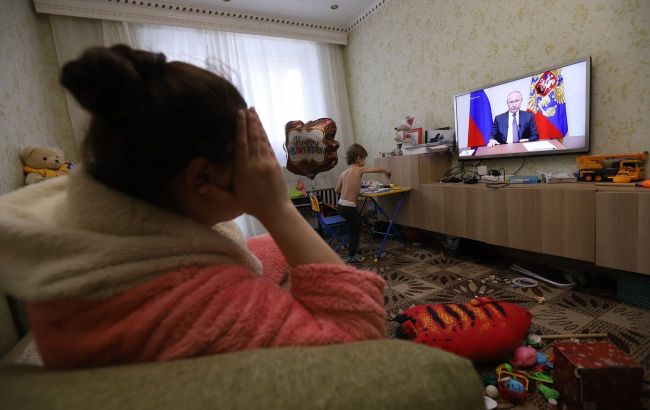Moscow imposes its war narrative on Donbas residents - British intelligence
 Moscow is imposing its view of the war on Donbas residents (Getty Images)
Moscow is imposing its view of the war on Donbas residents (Getty Images)
Residents of the Russian-controlled area of Donetsk Oblast in Ukraine are now receiving Russian-language local news bulletins from one of Russia’s major broadcast organisations. On September 4, VGTRK (All-Russia State Television and Radio Broadcasting Company) opened a Donetsk franchise and commenced broadcasting in the internationally unrecognised Donetsk People’s Republic (DPR)., according to the Ministry of Defense of the United Kingdom on Twitter.
As highlighted in the report, these local news updates are provided by the Russian TV channel "Russia 1" and represent the Russian perspective on the ongoing conflict. This is part of Russia's broader efforts to establish permanent control over this region.
According to British intelligence, Ukraine-based Russian language television and radio stations were freely available in the now-annexed areas before 2014. After the invasion, pan-Ukraine providers continued to provide locally sourced Russian-language content. DPR-government-controlled and aligned broadcasters also rebroadcast Russian national news programming as part of a propaganda campaign but did not provide regional bulletins.
Broadcasting VGTRK in Donetsk has taken over a year to achieve, having first been announced in 2022. This was almost certainly due to the refusal to work of trained local technicians. Those sympathetic to the DPR and with the required skills have now likely been brought in from Crimea, Luhansk and elsewhere, as stated in the report.
Although blocked over the airwaves, Ukrainian broadcasting is still accessible to a wide audience via the internet. Where Russian filtering restrictions are in force, audiences use VPN or other active circumvention technologies. Mobile phones linked to Ukrainian providers are highly likely unfettered, according to the Ministry of Defense.
Occupied areas of Donetsk and Luhansk regions
Russia occupied certain areas of the Donetsk and Luhansk regions in 2014-2015. Moscow declared the inclusion of these areas into the Russian Federation in 2022.
In 2022, the Sociological Group "Rating" recorded a significant deterioration in the attitudes of Ukrainians toward residents of the Russian-occupied Crimea and especially those in the Donetsk and Luhansk regions.

